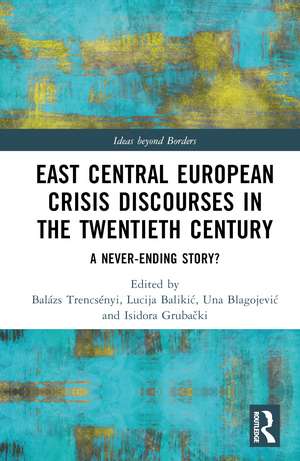East Central European Crisis Discourses in the Twentieth Century: A Never-Ending Story?: Ideas beyond Borders
Editat de Balázs Trencsényi, Lucija Balikić, Una Blagojević, Isidora Grubačkien Limba Engleză Hardback – 20 aug 2024
The term “crisis,” with its complex history, has emerged as one of the pivotal notions of political modernity. As such, reconstructing the ways the discourse of crisis functioned in various contexts and historical moments gives us a unique insight not only into a series of conceptual transformations, but also into the underlying logic of key political and intellectual controversies of the last two centuries. Studying the ways crisis was experienced, conceptualized, and negotiated can contribute to the understanding of how various visions of time and history shape political thinking and, conversely, how political and social reconfigurations frame our assumptions about temporality and spatiality.
A historical region wedged in between various competing imperial centers, East Central Europe has been an area often associated with crisis phenomena by both internal and external observers. Seeking to employ the regional gaze as a vantage point to reflect on issues which are relevant well beyond those countries between the Baltic and the Adriatic, this project is also in dialogue with a number of recent transnational attempts to rethink political and intellectual history with regard to the recurrent epistemological frames that structure the political and cultural debate. This book will thus be useful both for researchers, from the field of intellectual history and numerous adjacent fields, and graduate university students alike.
Din seria Ideas beyond Borders
-
 Preț: 280.72 lei
Preț: 280.72 lei -
 Preț: 281.72 lei
Preț: 281.72 lei -
 Preț: 311.41 lei
Preț: 311.41 lei -
 Preț: 311.41 lei
Preț: 311.41 lei -
 Preț: 386.51 lei
Preț: 386.51 lei -
 Preț: 311.06 lei
Preț: 311.06 lei -
 Preț: 387.42 lei
Preț: 387.42 lei -
 Preț: 391.65 lei
Preț: 391.65 lei - 18%
 Preț: 1023.13 lei
Preț: 1023.13 lei
Preț: 963.81 lei
Preț vechi: 1175.37 lei
-18% Nou
184.43€ • 192.95$ • 153.20£
Carte tipărită la comandă
Livrare economică 02-16 aprilie
Specificații
ISBN-10: 1032572051
Pagini: 440
Ilustrații: 2
Dimensiuni: 152 x 229 mm
Greutate: 0.97 kg
Ediția:1
Editura: Taylor & Francis
Colecția Routledge
Seria Ideas beyond Borders
Locul publicării:Oxford, United Kingdom
Public țintă
Academic and PostgraduateCuprins
Part I. Interwar Crises of Body and Soul
- Balázs Trencsényi: “Crisis without Catharsis? Crisis Discourses and the Problem of Political Modernity in Interwar East Central Europe”
- Johannes Bent and Liisi Keedus: “Contesting German ‘Crisis Literature’: Oswald Spengler in Interwar Hungarian and Romanian Reviews
- Vilius Kubekas: “Confronting the Spiritual Crisis: The Philosophical and Political Reorientation of Lithuanian Catholicism in the mid-1930s”
- Suzana Vuljević: “Order Amid Chaos: The Crisis of Spirit and a Panoply of Pan-Balkan Solutions in Interwar Europe”
- Lucija Balikić: “Coming of Age with Crisis: Discourses on the ‘National Body’ in Youth Organizations of Interwar Yugoslavia and Hungary”
- Kristina Andělová and Isidora Grubački: “Crises of Feminism and Democracy in the Interwar Period. Yugoslav and Czechoslovak Entanglements”
- Katherine Lebow: “Bodies in Crisis: Women and Unemployment in Polish Sociological Research of the 1930s”
Part II. Crises of Transition To and From Socialism
- Olga Byrska: “Crisis, Revolution, Reconstruction? Early Postwar Debates on Social and Political Transformation in Poland”
- Julius Horvath: “Market Crisis and National Happiness: A Study of the Slovak and Czech Responses to Crisis in the Twentieth Century”
- Una Blagojević: “The Cunning of Crisis and Yugoslav Marxist Humanism”
- Stevo Đurašković: “Predrag Matvejević: The Crisis of Socialist Yugoslavia as a Crisis of Yugoslav Identity”
- Marko Zajc: “The Nova revija Magazine’s 1986 Survey on the Yugoslav crisis”
- Benedek Pál: “‘We all talk about crisis, but what do we mean by crisis?’ Polish and Hungarian Intellectuals Negotiating the Crisis of State Socialism in the First Half of the 1980s”
- Viola Lászlófi: “The Crisis of Biopolitics or Biopoliticizing the Crisis? Discourses on the Problems of Socialist Healthcare in Late Socialist Hungary”
- Martin Babička: “Discourses of Moral and Ecological Crisis in Czech Postsocialist Transformation”
- Tjaša Konovšek: “Crisis as Political Criticism: Slovenia, Post-communism, and the Conservative Turn”
Notă biografică
Lucija Balikić is a PhD candidate at the Department of History, Central European University. Her research interests include intellectual and social history of late Austria-Hungary and interwar Yugoslavia. She published several research articles on history of knowledge production and body-politics in regional and international journals.
Una Blagojević is a PhD candidate at the Department of History, Central European University and a research assistant at the Babeș-Bolyai University, Cluj. Her doctoral research focuses on the intellectual history of Marxist Humanism in socialist Yugoslavia, and she is broadly interested in the social, cultural, and gender histories of East Central Europe. She is a member of the ERC project The History of Feminist Political Thought and Women’s Rights Discourses in East Central Europe 1929-2001 (HERESEE), hosted at the University of Vienna.
Isidora Grubački is a historian focusing on contemporary European history, specializing in the fields of transnational women’s history and intellectual history of feminism in the interwar period. She works as research assistant at the Institute of Contemporary History in Ljubljana and is currently a member of the ERC project The History of Feminist Political Thought and Women's Rights Discourses in East Central Europe 1929–2001 (HERESSEE), hosted at the University of Vienna.
